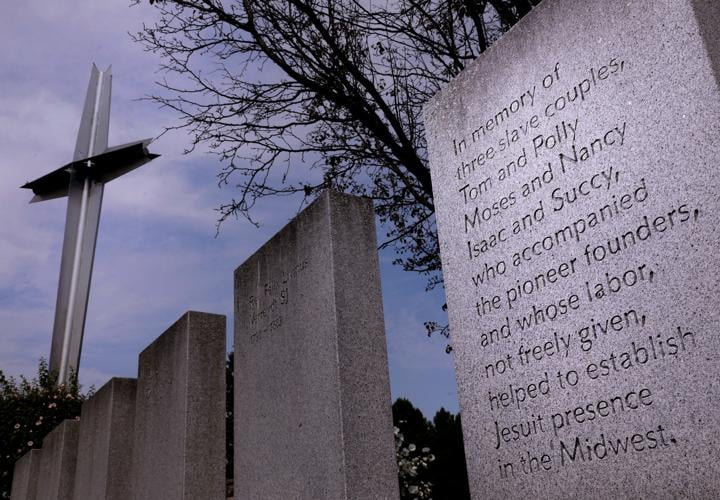
A gravesite memorial for the Jesuits, photographed on Thursday, Sept. 10, 2020 at Calvary Cemetery, commemorates the first six slaves the missionaries brought with them to Missouri from Maryland in 1823 to establish St. Stanislaus Seminary in Florissant. The same Jesuits went on to found St. Louis University. Research is underway to shine light on their connection to enslaved people and to locate descendants. Photo by Christian Gooden, cgooden@post-dispatch.com
ST. LOUIS — The descendants of slaves forced to work at St. Louis University in the 1800s will have to wait on a promised apology from the school’s leaders.
Five days ago, SLU President Fred Pestello invited the community to a prayer service where the university would offer a “formal apology for its historical participation in the grave sin of slavery.”
About an hour and a half before the 2 p.m. service Wednesday at St. Francis Xavier Church, Pestello sent another email saying the event was postponed.
“In a number of forthright and challenging conversations this week, it became clear that we need to continue the work of building relationships with descendants before we are ready to proceed with a formal event,” Pestello wrote. “We are saddened by this change in today’s plans. However, this postponement does not signal an end to our engagement with reconciliation efforts. We remain hopeful for the future.”
People are also reading…
The email came soon after representatives from the nonprofit Descendants of the St. Louis University Enslaved informed the university that they “did not wish to participate,” said SLU spokesman Clayton Berry. “We respect their decision.”
The group’s members have been pushing for reparations from the university since 2019, when they learned of their family history from researchers at the Slavery, History, Memory and Reconciliation Project.
Robin Proudie, the group’s executive director, could not be reached Wednesday.
The research project, a partnership between the Jesuits and SLU to uncover their history of slaveholding, including finding and reconciling with descendants, was slowed by the pandemic and downsized in recent years.

A plaque on “The Rock Building,” photographed on Wednesday, Sept. 2, 2020, says it was built by the Jesuits in 1840, originally for Jesuit missionaries at St. Stanislaus Seminary in the Florissant area. Photo by Christian Gooden, cgooden@post-dispatch.com
Last month, SLU hosted a “Lights of Remembrance” vigil in collaboration with Proudie’s group to honor “the lives and contributions of enslaved individuals who helped build and sustain the University and other Jesuit missions in Missouri in the 19th century,” according to the university’s .
The vigil was a significant step in the reparations process that would be followed by the public apology, Proudie told the SLU student publication .
“We’re here to take them (our ancestors) out of the darkness and bring them into the light for their contributions and for their sacrifice. We are a living testament, and we will not stop until everyone who walks through these doors knows who — along with the Jesuit founders — were there doing the heavy lifting,” Proudie said at the vigil.
The Jesuits, a Roman Catholic religious order that has guided SLU since its founding in 1818, were slaveholders in the region starting in 1823.
Jesuit pioneers like Pierre-Jean De Smet brought six slaves from Maryland to establish a mission in Missouri. By 1865, they had enslaved at least 74 people in the St. Louis region. The slaves were mainly forced to work at the university, its church and St. Stanislaus Seminary, which started as a farm in the Florissant area.
Eleven SLU presidents were slaveowners, according to .
The apology from SLU was intended as “an important step forward in an ongoing journey toward truth, healing and reconciliation,” Pestello wrote in the invitation sent Friday.
“As we express sorrow for this deeply painful history, we will also join with descendants to honor the lives and legacies of those persons who were enslaved by the Society of Jesus at Saint Louis University,” he said.
Leaders from the Descendants Truth and Reconciliation Foundation based in Baton Rouge had traveled to St. Louis to attend the prayer service and apology, including president Monique Trusclair Maddox, and the Rev. Tim Kesicki, a founding partner and past president of the Jesuit Conference of Canada and the United States.
Maddox and Kesicki declined to comment Wednesday after the service was canceled. The foundation started in 2016, after Georgetown University apologized for its role in slavery, to support reconciliations by other Jesuit-affiliated organizations.
Students and community activists across the United States are pressing colleges to take more ambitious steps to pay reparations to victims of slavery and racial injustices that benefited the institutions.
















